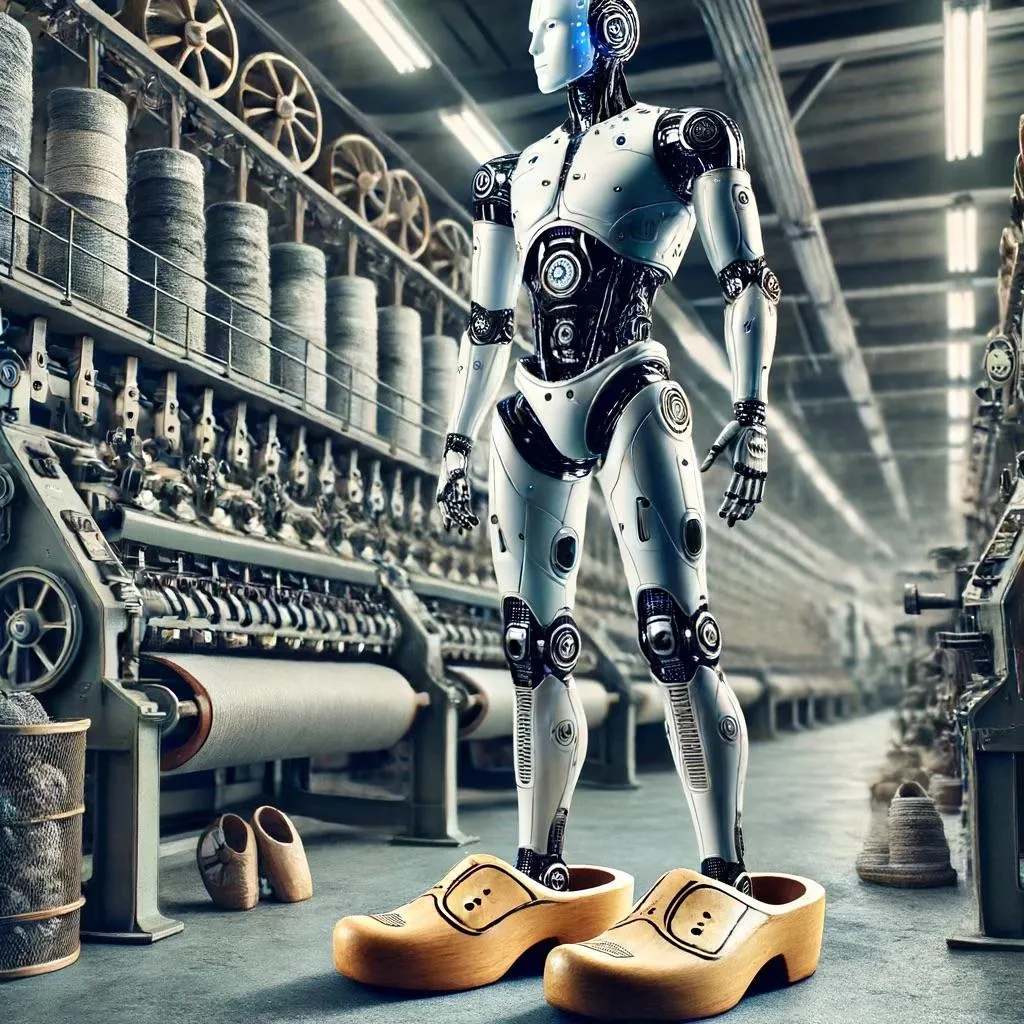Job Board

From Sabots to Silicon: Parallels Between Historical Labor Movements and AI Revolution
The story of workers throwing their wooden shoes, or "sabots," into machinery to halt production is a powerful image that encapsulates the struggles of laborers during the Industrial Revolution. This act of defiance, which gave birth to the term "sabotage," symbolizes the tensions between human labor and mechanization. Fast forward to the 21st century, and we find ourselves in the midst of another transformative period: the rise of artificial intelligence (AI). This technological revolution poses new challenges and opportunities, echoing the conflicts and anxieties of the past. Let's explore the parallels between the historical saboteur movement and the current upheavals surrounding AI.
The Industrial Revolution: Sabotage and Survival
During the Industrial Revolution, rapid advancements in technology fundamentally altered the landscape of work. Mechanized looms, printing presses, and other innovations increased productivity but also threatened the livelihoods of skilled workers. In response, some laborers resorted to sabotage, deliberately damaging machinery to protect their jobs and protest poor working conditions. The term "sabotage" is believed to stem from the French word "sabot," referring to wooden shoes that workers supposedly threw into machinery to disrupt production.
These acts of resistance were driven by a fear of obsolescence and a desire for better working conditions. Labor unions and movements emerged, advocating for workers' rights and pushing for reforms such as reasonable working hours, safer conditions, and fair wages. The struggle was not merely about technology but about ensuring that the benefits of progress were shared more equitably.
The AI Revolution: A New Frontier of Uncertainty
Today, artificial intelligence represents a new frontier of technological advancement with profound implications for the workforce. AI and automation have the potential to revolutionize industries, from manufacturing and transportation to healthcare and finance. However, this transformation brings with it a host of challenges that mirror those faced by workers during the Industrial Revolution.
1. Job Displacement:
- Just as mechanization threatened the jobs of skilled artisans, AI poses a risk to a wide range of occupations. Routine and repetitive tasks are increasingly being automated, raising concerns about job displacement and economic inequality. Roles in customer service, data entry, and even some professional fields like law and medicine are susceptible to automation.
2. Skills and Education:
- The Industrial Revolution required workers to adapt to new machines and processes, often necessitating new skills and training. Similarly, the AI revolution demands a workforce that is adept at managing and working alongside intelligent systems. This shift underscores the importance of education and continuous learning to equip workers with the skills needed in an AI-driven economy.
3. Ethics and Fairness:
- Historical labor movements sought fair treatment and justice for workers. In the age of AI, ethical considerations are paramount. Issues such as algorithmic bias, privacy, and the ethical use of AI technologies are at the forefront of discussions. Ensuring that AI systems are designed and implemented in ways that are fair and just is a critical concern.
4. Labor Movements and Advocacy:
- The rise of AI has sparked new forms of labor activism. Workers in tech companies have organized to demand greater transparency and ethical standards in AI development. There are calls for regulations to ensure that the benefits of AI are widely shared and that the negative impacts on employment are mitigated.
Learning from History: Towards an Inclusive Future
The historical narrative of sabotage during the Industrial Revolution provides valuable lessons for navigating the challenges posed by AI. While technology has the potential to drive progress and improve lives, it must be managed in ways that are inclusive and equitable. Here are some principles to guide this journey:
1. Inclusive Dialogue:
- Engaging a broad range of stakeholders, including workers, policymakers, and technologists, is crucial for addressing the impacts of AI. Collaborative efforts can help shape policies that promote fair labor practices and mitigate job displacement.
2. Lifelong Learning:
- Investing in education and reskilling initiatives is essential. Providing workers with opportunities to acquire new skills and adapt to changing job requirements can help smooth the transition to an AI-driven economy.
3. Ethical Standards:
- Developing and enforcing ethical guidelines for AI development and deployment is critical. Ensuring transparency, accountability, and fairness in AI systems can help build trust and address concerns about bias and misuse.
4. Economic Redistribution:
- Considering policies that redistribute the economic gains from AI more equitably can help reduce inequality. This might include measures such as universal basic income, profit-sharing schemes, or enhanced social safety nets.
Conclusion
The tale of workers using their sabots to halt the advance of mechanization is a reminder that technological progress is not without its challenges. As we navigate the AI revolution, it is essential to draw on the lessons of history to ensure that this new wave of innovation benefits all members of society. By fostering inclusive dialogue, investing in education, upholding ethical standards, and considering economic redistribution, we can strive towards a future where AI enhances human potential and contributes to a more just and equitable world.

Helping business' fulfill employment needs. Helping people find fulfilling careers. We are the fulfillment experts.
Trending Careers
Web Developer
Software Engineer
UIUX Designer
Back End Developer
Contact Us
Let's talk about what Jump Contact can
do for your business!
(260) 377-3383
© 2023 Francois Recruiting. All Rights Reserved
Privacy Policy | Terms of Use
Job Board

From Sabots to Silicon: Parallels Between Historical Labor Movements and AI Revolution
The story of workers throwing their wooden shoes, or "sabots," into machinery to halt production is a powerful image that encapsulates the struggles of laborers during the Industrial Revolution. This act of defiance, which gave birth to the term "sabotage," symbolizes the tensions between human labor and mechanization. Fast forward to the 21st century, and we find ourselves in the midst of another transformative period: the rise of artificial intelligence (AI). This technological revolution poses new challenges and opportunities, echoing the conflicts and anxieties of the past. Let's explore the parallels between the historical saboteur movement and the current upheavals surrounding AI.
The Industrial Revolution: Sabotage and Survival
During the Industrial Revolution, rapid advancements in technology fundamentally altered the landscape of work. Mechanized looms, printing presses, and other innovations increased productivity but also threatened the livelihoods of skilled workers. In response, some laborers resorted to sabotage, deliberately damaging machinery to protect their jobs and protest poor working conditions. The term "sabotage" is believed to stem from the French word "sabot," referring to wooden shoes that workers supposedly threw into machinery to disrupt production.
These acts of resistance were driven by a fear of obsolescence and a desire for better working conditions. Labor unions and movements emerged, advocating for workers' rights and pushing for reforms such as reasonable working hours, safer conditions, and fair wages. The struggle was not merely about technology but about ensuring that the benefits of progress were shared more equitably.
The AI Revolution: A New Frontier of Uncertainty
Today, artificial intelligence represents a new frontier of technological advancement with profound implications for the workforce. AI and automation have the potential to revolutionize industries, from manufacturing and transportation to healthcare and finance. However, this transformation brings with it a host of challenges that mirror those faced by workers during the Industrial Revolution.
1. Job Displacement:
- Just as mechanization threatened the jobs of skilled artisans, AI poses a risk to a wide range of occupations. Routine and repetitive tasks are increasingly being automated, raising concerns about job displacement and economic inequality. Roles in customer service, data entry, and even some professional fields like law and medicine are susceptible to automation.
2. Skills and Education:
- The Industrial Revolution required workers to adapt to new machines and processes, often necessitating new skills and training. Similarly, the AI revolution demands a workforce that is adept at managing and working alongside intelligent systems. This shift underscores the importance of education and continuous learning to equip workers with the skills needed in an AI-driven economy.
3. Ethics and Fairness:
- Historical labor movements sought fair treatment and justice for workers. In the age of AI, ethical considerations are paramount. Issues such as algorithmic bias, privacy, and the ethical use of AI technologies are at the forefront of discussions. Ensuring that AI systems are designed and implemented in ways that are fair and just is a critical concern.
4. Labor Movements and Advocacy:
- The rise of AI has sparked new forms of labor activism. Workers in tech companies have organized to demand greater transparency and ethical standards in AI development. There are calls for regulations to ensure that the benefits of AI are widely shared and that the negative impacts on employment are mitigated.
Learning from History: Towards an Inclusive Future
The historical narrative of sabotage during the Industrial Revolution provides valuable lessons for navigating the challenges posed by AI. While technology has the potential to drive progress and improve lives, it must be managed in ways that are inclusive and equitable. Here are some principles to guide this journey:
1. Inclusive Dialogue:
- Engaging a broad range of stakeholders, including workers, policymakers, and technologists, is crucial for addressing the impacts of AI. Collaborative efforts can help shape policies that promote fair labor practices and mitigate job displacement.
2. Lifelong Learning:
- Investing in education and reskilling initiatives is essential. Providing workers with opportunities to acquire new skills and adapt to changing job requirements can help smooth the transition to an AI-driven economy.
3. Ethical Standards:
- Developing and enforcing ethical guidelines for AI development and deployment is critical. Ensuring transparency, accountability, and fairness in AI systems can help build trust and address concerns about bias and misuse.
4. Economic Redistribution:
- Considering policies that redistribute the economic gains from AI more equitably can help reduce inequality. This might include measures such as universal basic income, profit-sharing schemes, or enhanced social safety nets.
Conclusion
The tale of workers using their sabots to halt the advance of mechanization is a reminder that technological progress is not without its challenges. As we navigate the AI revolution, it is essential to draw on the lessons of history to ensure that this new wave of innovation benefits all members of society. By fostering inclusive dialogue, investing in education, upholding ethical standards, and considering economic redistribution, we can strive towards a future where AI enhances human potential and contributes to a more just and equitable world.

Helping business' fulfill employment needs. Helping people find fulfilling careers. We are the fulfillment experts.
Site Links
Trending Careers
Web Developer
Software Engineer
UIUX Designer
Back End Developer
Contact Us
Let's talk about what Jump Contact can
do for your business!
(260) 377-3383
© 2023 Francois Recruiting. All Rights Reserved
Privacy Policy | Terms of Use


